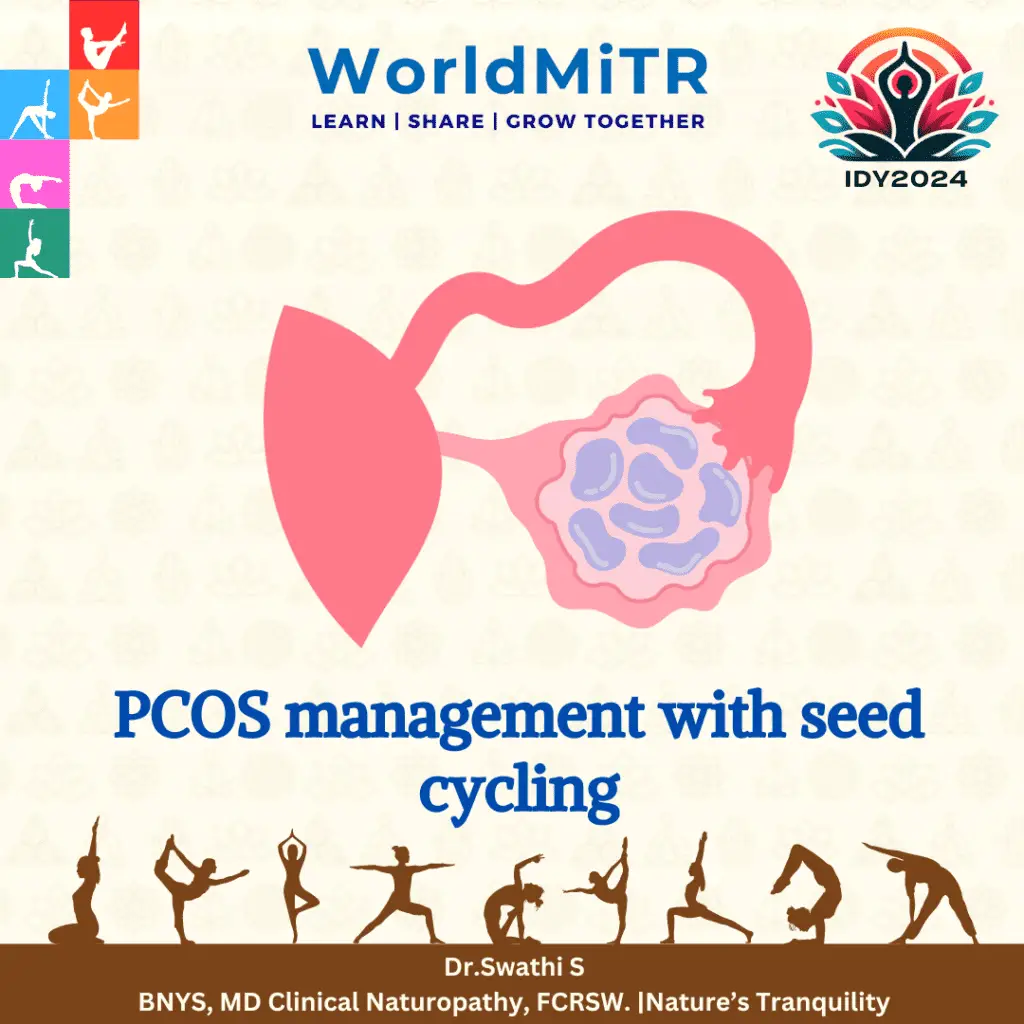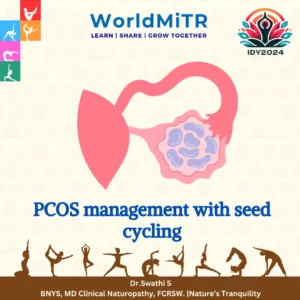PCOS management with seed cycling

IDY2024 - PCOS management with seed cycling | Dr.Swathi S BNYS, MD Clinical Naturopathy, FCRSW. | Nature’s Tranquility
Introduction
PCOS stands as the most common endocrine condition affecting reproductive-aged women. Initially identified by Stein and Leventhal as a syndrome characterized by hirsutism, acne, and obesity often accompanied by oligo-amenorrhea and polycystic ovaries, it’s also known as Stein-Leventhal Syndrome, boasting a prevalence ranging between 5% and 15%.
Understanding PCOS
Causes of PCOS include improper dietary patterns, poor lifestyle choices, and stress, which contribute to metabolic problems and reproductive dysfunction underlying its pathophysiology. This condition manifests in hyperandrogenism and insulin resistance, disrupting the hypothalamus-pituitary-ovarian axis.
The Menstrual Cycle: A Brief Overview
The menstrual cycle comprises two categorised phases: the follicular/proliferative phase and the luteal/secretory phase. Just before ovulation, follicle-stimulating hormone (FSH) and luteinizing hormone (LH) levels rise, while estrogen levels dip post-ovulation. The luteal phase follows ovulation, witnessing a gradual rise in progesterone and estrogen levels, maintaining a delicate balance crucial for conception and implantation.
Harnessing Seed Cycling for Hormonal Balance
Seed cycling, a natural approach gaining traction, involves incorporating four types of seeds—pumpkin, flax, sesame, and sunflower—into the diet. These seeds are consumed during each phase of the menstrual cycle, aiding in hormonal balance.
Follicular Phase: Boosting Estrogen
During the follicular phase, characterized by rising estrogen levels, pumpkin and flax seeds play pivotal roles.
- Pumpkin Seeds: Nutrient Powerhouses – Flax seeds, scientifically known as Linum usitatissimum, boast active components like alpha-linolenic acid, dietary fiber, and phytoestrogenic lignans. These lignans elevate sex hormone-binding globulin levels, reducing the bioavailability of free testosterone and enhancing testosterone activity. Pumpkin seeds, abundant in nutrients like linoleic acid, palmitic acid, oleic acid, and stearic acid, contribute to estrogen hormone regulation in the menstrual cycle and reproduction.
Luteal Phase: Supporting Progesterone Production
In the luteal phase, sesame and sunflower seeds aid in progesterone production.
- Sesame Seeds: Counteracting Estrogen – Sesame seeds, besides containing lignans that counter excess estrogen as progesterone levels surge, are rich in zinc, facilitating progesterone production.
- Sunflower Seeds: Vitamin-Rich Support -Sunflower seeds, belonging to the Asteraceae family, are rich in selenium and vitamin E. Vitamin E promotes progesterone production additionally selenium aids liver detoxification.
Evidence and Conclusion
An experimental study conducted in 2023 by Rasheed et al. concluded that seed cycling, involving 15g of each seed divided into two sets for the follicular and luteal phases, respectively, proves effective in managing PCOS. This strategy yields notable outcomes for PCOS-affected females, promoting hormonal balance and a healthier lifestyle.
Reference
- Robert L. Rosen field, David A. Ehrmann, The Pathogenesis of Polycystic Ovary Syndrome (PCOS): The Hypothesis of PCOS as Functional Ovarian Hyperandrogenism Revisited, Endocrine Reviews, Volume 37, Issue 5, 1 October 2016.
- Stephen Franks, Diagnosis of Polycystic Ovarian Syndrome: In Defense of the Rotterdam Criteria, The Journal of Clinical Endocrinology & Metabolism, Volume 91, Issue 3, 1 March 2006.
- Shahid R, Awan KA, Iqbal MJ, Munir H, Saeed I. Diet and lifestyle modifications for effective management of polycystic ovarian syndrome (PCOS). Journal of Food Biochemistry. 2022 Jul;46(7):e14117.
- Harada M. Pathophysiology of polycystic ovary syndrome revisited: Current understanding and perspectives regarding future research. Reproductive Medicine and Biology. 2022 Jan;21(1):e12487.
- Irfan T, Seher K, Rizwan B, Fatima S, Sani A. Role of Seed Cycling in Polycystic Ovarian Syndrome: Seed Cycling in PCOS. Pakistan BioMedical Journal. 2021 Dec 31;4(2):21
- Rasheed N, Ahmed A, Nosheen F, Imran A, Islam F, Noreen R, Chauhan A, Shah MA, Amer Ali Y. Effectiveness of combined seeds (pumpkin, sunflower, sesame, flaxseed): As adjacent therapy to treat polycystic ovary syndrome in females. Food Science & Nutrition. 2023 Mar 25.
Dr.Swathi S | BNYS, MD Clinical Naturopathy, FCRSW. | Nature’s Tranquility
Also Read






